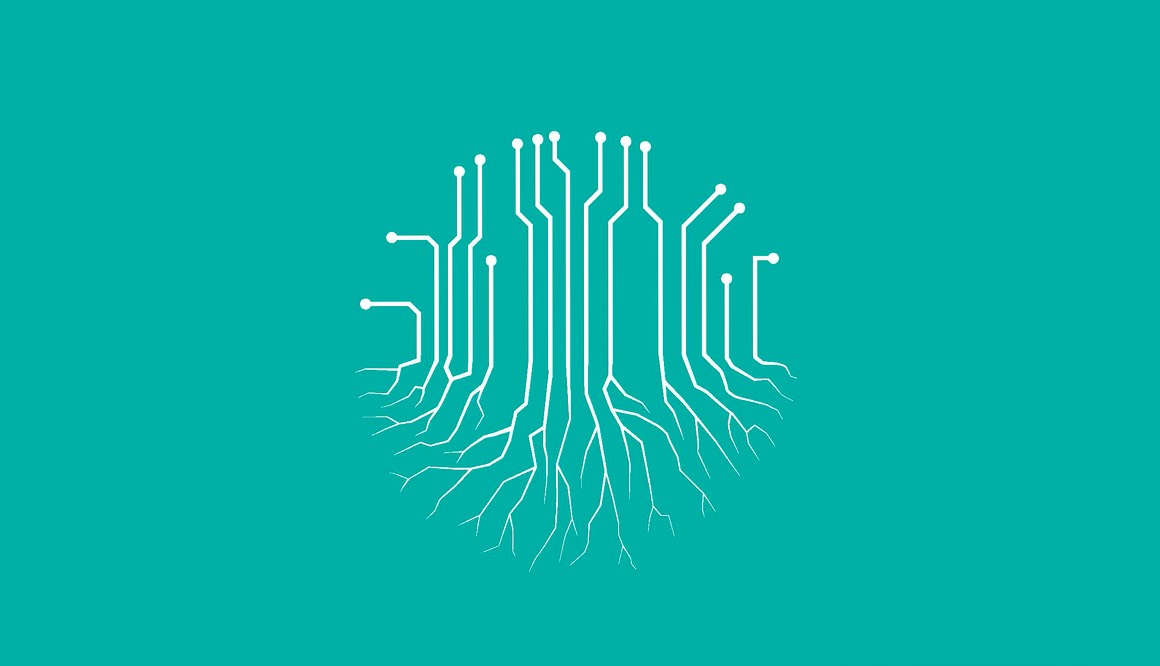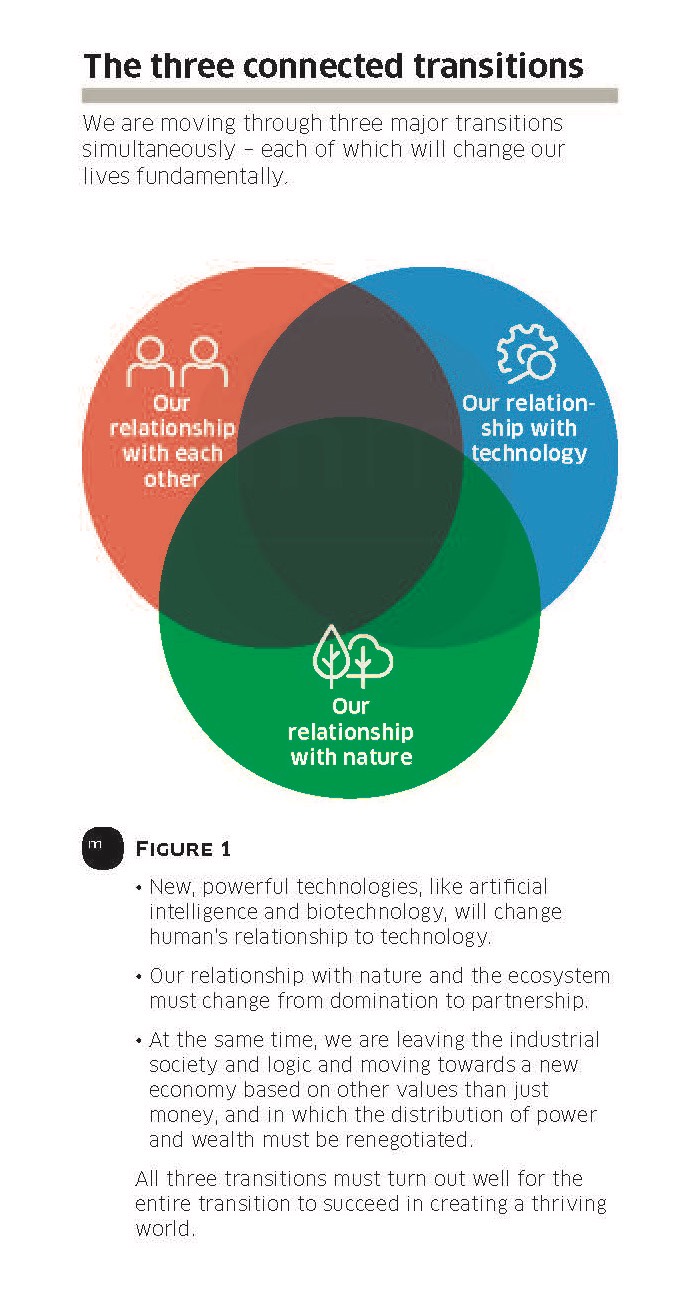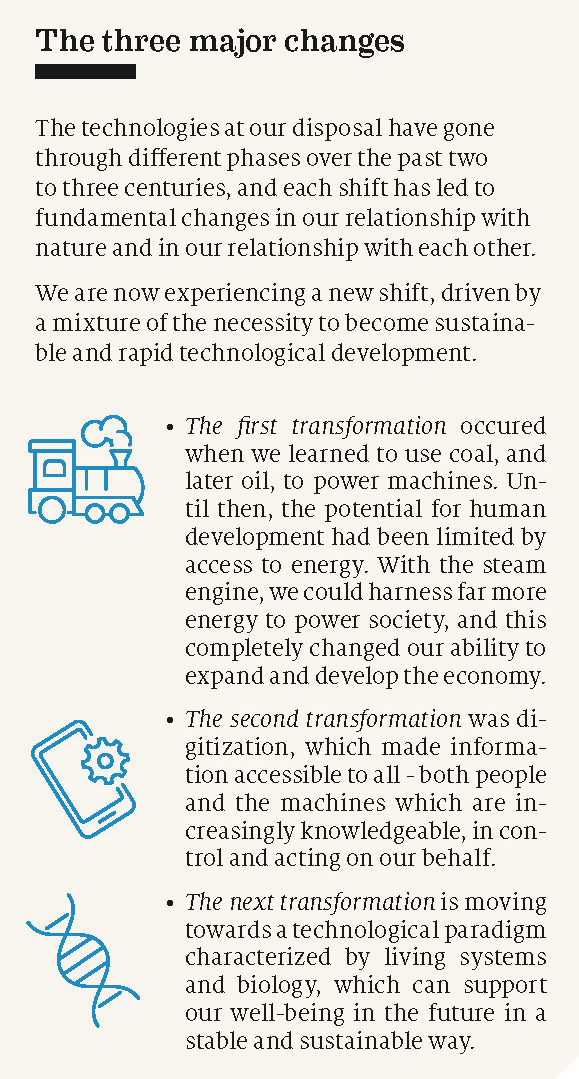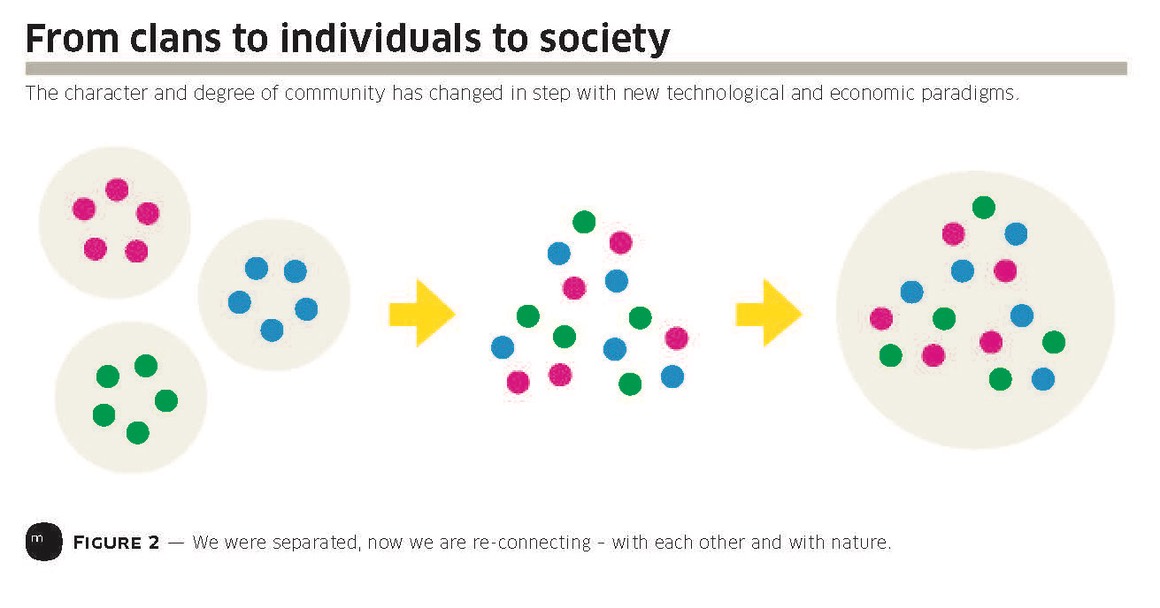
In the 19th and early 20th century, the machine was the metaphor for society. Industrialization was based on automated, mechanical mass production, and capitalism, with its focus on money and growth, was the underlying logic of the economy.
Then came computers, and with digitization came an economy that was based on bits and information - increasingly virtual and detached from the limitations of the physical world.
The basis of the next technological paradigm is biology and living systems. We are now learning to direct and apply the mechanisms of biology as technology with ever-increasing precision and scientific insight. Just as cell phones and internet connectivity have fundamentally changed our lives and society in recent decades, biotechnology will change our conditions in the 21st century.
We will mobilize biology to deliver what we currently produce with fossil energy, chemistry and mechanics.
Liquid fuels and plastics can be produced by microorganisms designed to excrete very specific substances and materials. Fermentation, as it is called, can also be used to manufacture a very wide range of specialized proteins - for instance for food and medicine.
A large part of meat production will be replaced with synthetic meat from cell cultures, and this will significantly increase resource efficiency and reduce the environmental impact.
At the same time, our technology will increasingly have life-like properties. Robots will eerily resemble animals or humans; artificial intelligence will be able to learn from experience and form its own opinions.
We will produce microprocessors and construct new materials at the scale of life; with structures as small and intricate as the building blocks of life we find in cells and DNA.

The principles of living systems
In my book "Transformation to the Future" I argue that the next technological paradigm is characterized and inspired by biology and living systems. Our everyday life will be changed by specific techniques like genetic modification or machine learning. But the paradigm of living technology will also shape our understanding of how the systems around us work.
Living systems are ecosystems. There must be a balanced interaction between the many different parts of the system, otherwise it will collapse. If one wants to thrive in the long run, one has to ensure that all other elements of the system thrive as well. Therefore, ideas such as circularity, balance, symbiosis, resilience and regeneration become central.
There are a wide range of characteristics and principles that recur in all living systems. Often, they are almost the opposite of the rules of the game we have created in the mechanical and digital economy. My claim is that we need to adjust the narrative and start acting much more in accordance with the principles of ecosystems.
For me, it has been fascinating to analyze how living systems work, and to discover how these mechanisms in many respects provide principles that are relevant to guiding and shaping the technologies and economics of the coming decades.
Briefly, this includes principles such as:
· Ecosystems are circular. The waste from one process becomes raw material in other processes. An ecosystem consists of a multitude of creatures and organisms, each evolved to play a specific part in the vast streams that transform materials and energy into ever-changing forms. It is a balanced interaction where everyone plays a part so as not to break the chain.
· An organism cannot function in isolation. It is in constant interaction with the environment. The world consists of interconnected and interacting systems. You cannot fully understand a system by disassembling it and examining the individual components - you need to consider the interactions and relations between the members as it unfolds.
· There must be balance - and there are critical boundaries which should not exceeded if the balance is to be maintained. If the threshold is crossed, the system will shift to a new balance, but the living conditions in the new state may not be so attractive for those elements which had evolved to fit the old balance.
· Living systems have a rhythm. The weather changes, the seasons change. Organisms are born, they grow up, age and die, and what is possible or practical to do within the ecosystem is determined by the time of the day and the change of seasons.
· Nature's solutions are shaped to fit to the resources and energy that are available locally. Solutions prevail if they adapt to balance with the conditions around them - otherwise they have to move or die.
· Nature is resilient. Ecosystems can recover from severe perturbations because they have evolved through changing conditions and over a very long time, and along the way they have embedded backups, duplicates and variations, so that the entire system is not vulnerable to a shock.
· Diversity makes ecosystems robust and is a source of renewal. Variation is the foundation of evolution.
· Life is a complex, dynamic, adaptive system, and it can best be described and understood with concepts and mechanisms from systems theory, such as tipping points, self-organization, and feedback.
· Life is fundamentally unpredictable. As opposed to operating machines and computers, one needs to assess risks and probabilities, rather than to simply assume that everything will unfold as planned and programmed. We can estimate how living systems will evolve with some probability - but not with certainty.
These observations may sound obvious, almost banal, but when you study the ways in which biological systems work, it’s quite striking how problematic the current linear, monocultural, short-term and money-fixated industrial economic model is in comparison
It is precisely because we have placed ourselves outside and above the principles of living systems for so long that our technologies and the lifestyle, they enable are not sustainable.
The logic that dominated in a world of machines and computers becomes misleading when technology comes alive, and life becomes technology.
If we are to continue to thrive - or simply survive as a civilization and species - we need to understand and incorporate the principles and mechanisms that apply in nature and in living systems - and this requires a significantly more complex, connected and integrated perspective than our current approach.
The industrial narrative
Every technological paradigm comes with what Marx called a superstructure of ideology, societal structures, and narrative we tell ourselves in order to make sense of the conditions we find ourselves in.
The narrative that characterized industrialism is most clearly expressed by neoliberalism, a philosophy and a set of economic assumptions, based on the theories of economists like Friedrich Hayek and Milton Friedman. Neoliberalism evolved in the years after World War II and became the dominant logic in the early 1980s when Ronald Reagan and Margaret Thatcher came to power in the US and the UK.
It is a philosophy that places the individual - the rational human being, Homo Economicus - at the center. The world is a marketplace where individuals constantly weigh costs and risks in order to maximize their own financial return.
The marketplace reveals what people are really willing to pay for and who can deliver cheapest and best. Thus, resources are allocated and used most efficiently to those who can create the greatest value with the resources.
Anything beyond a minimal state is considered a distortion; taxes and duties, regulation, social security schemes, etc. just end up restricting the individual's freedom and creative efforts, or it leads to corruption. If, on the other hand, entrepreneurs have freedom and are encouraged to create because they can keep the profits, wealth will be distributed, trickle downwards and create jobs and value for all.
Social beings and individualists
Neoliberalism is well aligned with Darwin's theory of evolution, which describes how the fittest survive and how humans compete among each other for status and power and thus access to reproduce. Building on the most successful individuals strengthens the entire species.
But if evolution only works by individuals competing with each other to pass on their genes, then no one should do anything for others. Yet, there are clearly plenty of people who do help each other - sometimes even with their life at stake.
In fact, it is often impossible to solve anything beyond the most trivial tasks if you do not collaborate with others. This is nothing new, it traces all the way back to the earliest hunters. Individually, you could catch a small animal like a hare or a bird, but you had to cooperate if you were to kill an ox.
In other words: Progress and value creation does not only happen through competition, but also through collaboration.
The recently deceased evolutionary biologist EO Wilson is among the researchers who have shown that evolution also promotes and favors social traits and that these are crucial to our survival: Our strong tendency to form groups and build relations. Our ability to gauge each other and our empathy for reading feelings and intentions of others. Our generosity and willingness to share. And our unique ability to communicate via language, not least.
For humans, therefore, Darwinian competition and the selection of the fittest works at two levels: Internally, in the group we belong to, we compete to be the strongest individual that gets to pass on our genes. At the same time, we cooperate in order to compete against other groups, and to expand our territory and access to resources.
In industrial society, people were mainly characterized as selfish, independent, hedonistic and rational – a view which fit nicely with the principles of liberal capitalism.
But we are also loving, cooperative, empathic, interdependent, altruistic - and I would argue that those qualities will become far more relevant for making it through the coming decades intact and with a functioning and flourishing civilization in an increasingly complex and interconnected world.
We are not just individuals, we are part of a society and an economy, and we are completely dependent on the system working and staying reasonably balanced. We are so tightly connected and so intensely interacting, it no longer makes sense to think only of ourselves as separate, independent individuals or sovereign nations that can do as we please.
The pendulum is swinging back towards a greater focus on community and a shared fate - both in relation to nature and to our fellow human beings.
Make peace with nature, we are on the same team
Our relationship with nature needs restoring. It is deep seated in our culture that humans have a special position in the global ecosystem. We are the dominant species, and we alone have the ability and power to consciously determine the well-being of the entire planet.
Our infrastructure and our cities mark the earth, the majority of the planet's biomass has been adapted to our needs, and we can intervene in everything from the earth’s climate to own genes. We have created a new nature, characterized by technology and human activity - we have entered the Anthropocene era, where ecosystems are something to be managed and sustainability is a matter of efficient and accurate resource management.
Since industrialization, humans have waged an extensive and intense war to conquer, suppress and exploit nature. We have interpreted our special status as if we had carte blanche to dispose of nature for our purposes alone.
In many respects, we have placed ourselves outside of nature. In the economy, the resources of nature and the well-being of ecosystems are seen as an externality - we typically don’t account for it when we make decisions, either as consumers or companies.
Now we must make peace with nature, not just for the sake of the ecosystems, but also because we are undermining the foundation of our civilization. We need to realize that you can’t win against nature, without losing yourself.

It’s all connected
An economic model where one simply gobbles up nature and spits out the waste is not sustainable - and likewise, an economy that consumes people to create money is not an durable strategy. The system needs to be balanced to create long term well-being for everyone.
Digitization and globalization have created a ‘winner take all’ economy. But in a system in which we are dependent on one another, it doesn’t work if only one party is rewarded through the interaction. If the winner takes it all, everyone loses in the long run. If the predators eat all the prey, there will be no more food next time.
Our freedom and opportunities are closely linked to responsibility for, and accountability towards, the well-being of the entire system. If we only try to extract as much as possible for ourselves, the system will collapse for everyone.
In key areas, we have to develop new forms of governance if the ground rules of society are to keep pace with the technological and ecological realities.
It took many decades and often fierce struggles from the start of industrialization until a modern welfare state was established. In the same way, it will probably take some serious tussle to sort out and correct the imbalances in an economy dominated by digital, global platforms.
The goal is to develop mechanisms that can balance these considerations of solidarity, fairness and shared responsibility to create consistency and convergence between our personal interest and the common good. The institutions we create to organize the community, and the societal norms that they will reflect, are crucial to the other major transformations we need to go through in the coming decades.
Sun, moon and stars are aligned
It's not just for the fun of it that we have to go through a radical transformation. In my opinion, we have no choice - we can not proceed with the usual logic.
We are exceeding the boundaries of nature's ability to regenerate and continue to support us. Rising inequality in wealth threatens to trigger populist revolts - and extremely powerful new technologies threaten to displace us as the species in charge.
We are out of balance to a degree that, in many fundamental areas, we are approaching the tipping point where the usual order and logic will suddenly slip.
Like everyone else I'm worried - yet I have chosen to explore and present a fundamentally optimistic vision in my new book. It's easy to complain, worry and reject change and novelty, but we need to seize the opportunities and tools we have – otherwise, we are never going to get out of this mess. We must insist on pursuing solutions, or else it will at least never work.
The British sociologist Anthony Giddens describes how we are moving along "the edge of history", on the cusp of two very different trajectories for our civilization. Things can go really wrong – but actually, things could also go remarkably well. We are facing great challenges, but also plenty of opportunities to move forward, reduce problems and even create new progress and greater prosperity and happiness.
The key technologies that can bring us safely forward - energy from solar, wind and fusion, new types of food, intelligent and carbon neutral mobility, biological manufacturing - are all evolving at exponential speed, and they will advance radically already in this decade.
Rather than scarcity and crisis, we might be able to have everything we need, better, at a fraction of the price and with a much smaller burden on the planet. Leading think tanks like Rethink X and Singularity University claim that we are entering an age of abundance.
So there is definitely reason for hope. Across the world, lots of companies, researchers and public servants are working hard to develop sustainable solutions. Millions of young people are educating themselves and pursuing careers which are part of this transition. Technical journals are flooded with articles describing scientific breakthroughs and new, promising inventions.
It's quite encouraging once in a while to take a step back and survey the big changes we've made. We are in the process of mobilizing forces and knowledge to find a solution to our common problem - it is truly a global awakening. My clear feeling is that the ball is rolling now - and it is gaining more and more speed by the day.
I'm not saying this is easy. The obstacles to a successful transition are in plain sight. There are vested interests maintaining the old, industrial economy, and the incumbents employ armies of lobbyists and lawyers who will almost mechanically fight to prevent their clients from losing anything. There are politicians who cling to power by promising that everything will remain just like it used to be. And there are billions of people who each have to make challenging and sometimes costly choices to change their lifestyle, consumption, vacation, career, housing, and so on.
Plus, it’s all supposed to happen ASAP.

Somewhat philosophically, one might say that what we need is a leap in consciousness and organization. We are ME, but we are also WE.
Once upon a time, we lived in close interaction with nature and in local communities with a high degree of interdependence. Industrialization turned us into consumers within a mass society, free of responsibilities and commitments, and separate from nature. Digitization made us individualists.
Now we have to engage again in a new and much larger form of community, with each other and nature.